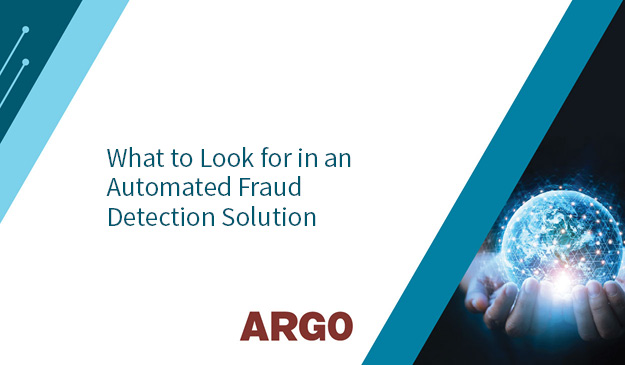With the continued risk of fraud occurrences in FIs, many banks and credit unions are utilizing automated fraud detection solutions to help remedy the issue. Organizations should look for solution providers that offer a multi-fund, cross-channel analysis platform to detect fraudulent items, fraudulent transactions, and money laundering activities with an integrated interface for adjudicating suspect items. In addition, there are nine solution areas that have become increasingly important in fraud prevention:
- Online, real-time fraud detection and response
The ability to accurately detect fraud in real time reduces both loss and the reputational cost of customer offense due to false positives. Having a solution in place that evaluates teller transactions at the point of presentment, providing transaction, image, and Bank Secrecy Act (BSA) and Anti-Money Laundering (AML) analysis helps reduce fraud in FIs. - Auto-holds
Automating the work of determining which items a hold should be placed on, how much the hold should be, and then automatically placing the hold, helps minimize Reg CC decision-making by the teller. - Anti-Money Laundering (AML) / Currency Transaction Report (CTR)
Identifying potential money laundering and terrorist financing activities, and enforcing due diligence helps financial institutions reduce regulatory risks, reputational risks, and financial losses. - Increased accuracy
Increasing accuracy by combining automated decision engines with predictive analytics, allows more “true suspect” items to be analyzed, fewer false positives returned, and a decreased analyst alert queue load. - Service optimization
Performance tuning and optimization services is a methodology used to ensure financial institutions achieve operational success with fraud prevention. - Commercial mobile positive pay
Fraud prevention is an essential and time-sensitive economic function that should not be restricted by physical location. This means account managers need the ability to monitor fraud attempts wherever they are when the alert occurs. - Automated Clearing House (ACH) transaction analysis
The ACH network facilitates a number of payment types, each with its own risks and dedicated detection methods. FIs need the ability to process and monitor both incoming and outgoing NACHA files. - Transit item analysis
First-party deposit fraud is typically perpetrated by customers who have a shorter history with the bank, deposit bad checks knowingly, and attempt to draw against those uncollected deposits. Third-party fraud may occur with customers who are well known by the institution but deposit checks from other institutions without knowing they are bad. It is crucial that FIs have the ability to monitor the checks from third-party institutions, or transit checks. - Fraud reporting
The Federal Reserve recently announced a new FraudClassifier™ model designed to improve the consistency of fraud classification and create a consistent taxonomy, leading to effective quantification of fraud losses. The purpose of the model is to classify fraud independent of payment type, payment channel, and other payment characteristics to create a holistic view of fraudulent events. Automated solutions are designed to help FIs with this fraud reporting function, allowing them to better meet compliance and regulatory needs.
Automated fraud solutions provide value in each of these areas by more accurately detecting and preventing fraud through multiple channels, at multiple points in time and contact with customers. Intelligent detection and machine decision-making allows for streamlined and accurate reporting, and improved strategic decisions by financial institutions in their fight against increasingly challenging fraud perpetrators.
For more information, download the “Changing the Game in Fraud Prevention” interview with David Engebos, President and COO of ARGO.





